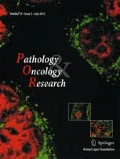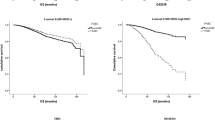Abstract
Pregnancy Associated Breast Cancer (PABC) manifests during pregnancy or within a year following delivery. We sought to investigate differences in management, outcome, clinical, histopathology and immunohistochemistry (IHC) characteristics of PABC and matched controls in a retrospective case control study. PABC and control patients were selected from breast cancer cases of women ≤45 years, diagnosed in the 2nd Department of Pathology, Semmelweis University, Budapest, Hungary between 1998 and 2012. Histopathology information on tumor type, grade, size, T, N, lympho-vascular invasion (LVI), Nottingham Prognostic Index (NPI), associated in situ lesions and IHC charcteristics: ER, PgR, HER2, Ki67, p53 were recorded, IHC-based subtype was assessed, clinical, management and outcome data were analysed. Thirty-one breast cancer cases were pregnancy related. Clinical management data did not differ in cases and controls. Histopathology of disease at presentation was not significantly different, but NPI assessed the PABC group as having poor, whereas controls as having intermediate prognosis. Associated in situ lesion was more often high grade Extensive Intraductal Carcinoma Component (EIC) in PABC. Triple negative and LuminalB prol tumors predominated in PABC. Disease-free and overall survival was inferior compared to controls. PABC patients with LuminalB prol and Triple negative tumors had inferior outcomes. On multivariate analysis inferior prognosis of PABC was associated with pregnancy. Our study has demonstrated inferior outcome of PABC. Difference in tumor biology is reflected by the predominance of triple negative and LuminalB tumors in PABC. The strength of the study is the analysis of complete pathology and IHC data.



Similar content being viewed by others
References
Johansson ALV, Andersson TM-L, Hsieh C-C, Cnattingius S, Lambe M (2011) Increased mortality in women with breast cancer detected during pregnancy and different periods postpartum. Cancer Epidemiol Biomark Prev 20(9):1865–1872. doi:10.1158/1055-9965.epi-11-0515
Woo Jc YTHTC (2003) Breast cancer in pregnancy: a literature review. Arch Surg 138(1):91–98. doi:10.1001/archsurg.138.1.91
Lyons T, Schedin P, Borges V (2009) Pregnancy and breast cancer: when they collide. J Mammary Gland Biol Neoplasia 14(2):87–98. doi:10.1007/s10911-009-9119-7
Liu Q, Wuu J, Lambe M, Hsieh S-F, Ekbom A, Hsieh C-C (2002) Transient increase in breast cancer risk after giving birth: postpartum period with the highest risk (Sweden). Cancer Causes Control 13(4):299–305. doi:10.1023/a:1015287208222
Lambe M, Hsieh C, Trichopoulos D, Ekbom A, Pavia M, Adami H-O (1994) Transient increase in the risk of breast cancer after giving birth. New England J Med 331(1):5–9. doi:10.1056/NEJM199407073310102
Nugent P, Connell TXO (1985) Breast cancer and pregnancy. Arch Surg 120(11):1221–1224
Ali SA, Gupta S, Sehgal R, Vogel V (2012) Survival outcomes in pregnancy associated breast cancer: a retrospective case control study. Breast J 18(2):139–144. doi:10.1111/j.1524-4741.2011.01201.x
Moreira WB, Brandão EC, Soares AN, Lucena CEM, Antunes CMF (2010) Prognosis for patients diagnosed with pregnancy-associated breast cancer: a paired case–control study. Sao Paulo Med J 128:119–124
Bonnier P, Romain S, Dilhuydy JM, Bonichon F, Julien JP, Charpin C, Lejeune C, Martin PM, Piana L (1997) Influence of pregnancy on the outcome of breast cancer: a case–control study. Int J Cancer 72(5):720–727. doi:10.1002/(sici)1097-0215(19970904)72:5<720::aid-ijc3>3.0.co;2-u
Azim HA, Santoro L, Russell-Edu W, Pentheroudakis G, Pavlidis N, Peccatori FA (2012) Prognosis of pregnancy-associated breast cancer: a meta-analysis of 30 studies. Cancer Treat Rev 38(7):834–842
Anders CK, Hsu DS, Broadwater G, Acharya CR, Foekens JA, Zhang Y, Wang Y, Marcom PK, Marks JR, Febbo PG, Nevins JR, Potti A, Blackwell KL (2008) Young age at diagnosis correlates with worse prognosis and defines a subset of breast cancers with shared patterns of gene expression. J Clin Oncol 26(20):3324–3330. doi:10.1200/jco.2007.14.2471
Middleton LP, Amin M, Gwyn K, Theriault R, Sahin A (2003) Breast carcinoma in pregnant women. Cancer 98(5):1055–1060. doi:10.1002/cncr.11614
Hahn KME, Johnson PH, Gordon N, Kuerer H, Middleton L, Ramirez M, Yang W, Perkins G, Hortobagyi GN, Theriault RL (2006) Treatment of pregnant breast cancer patients and outcomes of children exposed to chemotherapy in utero. Cancer 107(6):1219–1226. doi:10.1002/cncr.22081
Halaska MJ, Pentheroudakis G, Strnad P, Stankusova H, Chod J, Robova H, Petruzelka L, Rob L, Pavlidis N (2009) Presentation, management and outcome of 32 patients with pregnancy-associated breast cancer: a matched controlled study. Breast J 15(5):461–467. doi:10.1111/j.1524-4741.2009.00760.x
Azim HA Jr, Botteri E, Renne G, Dell’Orto P, Rotmensz N, Gentilini O, Sangalli C, Pruneri G, Di Nubila B, Locatelli M, Sotiriou C, Piccart M, Goldhirsch A, Viale G, Peccatori FA (2012) The biological features and prognosis of breast cancer diagnosed during pregnancy: a case–control study. Acta Oncol 51(5):653–661. doi:10.3109/0284186X.2011.636069
Murphy CG, Mallam D, Stein S, Patil S, Howard J, Sklarin N, Hudis CA, Gemignani ML, Seidman AD (2012) Current or recent pregnancy is associated with adverse pathologic features but not impaired survival in early breast cancer. Cancer 118(13):3254–3259. doi:10.1002/cncr.26654
Genin A-S, Lesieur B, Gligorov J, Antoine M, Selleret L, Rouzier R (2012) Pregnancy-associated breast cancers: do they differ from other breast cancers in young women? Breast Edinb Scotl 21(4):550–555
Pilewskie M, Gorodinsky P, Fought A, Hansen N, Bethke K, Jeruss J, Scholtens D, Khan S (2012) Association between recency of last pregnancy and biologic subtype of breast cancer. Ann Surg Oncol 19(4):1167–1173. doi:10.1245/s10434-011-2104-6
Reed W, Hannisdal E, Skovlund E, Thoresen S, Lilleng P, Nesland JM (2003) Pregnancy and breast cancer: a population-based study. Virchows Archiv 443(1):44–50. doi:10.1007/s00428-003-0817-z
Hammond MEH, Hayes DF, Dowsett M, Allred DC, Hagerty KL, Badve S, Fitzgibbons PL, Francis G, Goldstein NS, Hayes M, Hicks DG, Lester S, Love R, Mangu PB, McShane L, Miller K, Osborne CK, Paik S, Perlmutter J, Rhodes A, Sasano H, Schwartz JN, Sweep FCG, Taube S, Torlakovic EE, Valenstein P, Viale G, Visscher D, Wheeler T, Williams RB, Wittliff JL, Wolff AC (2010) American Society of Clinical Oncology/College of American Pathologists Guideline Recommendations for Immunohistochemical Testing of Estrogen and Progesterone Receptors in breast cancer. J Clin Oncol 28(16):2784–2795. doi:10.1200/jco.2009.25.6529
Wolff AC, Hammond MEH, Schwartz JN, Hagerty KL, Allred DC, Cote RJ, Dowsett M, Fitzgibbons PL, Hanna WM, Langer A, McShane LM, Paik S, Pegram MD, Perez EA, Press MF, Rhodes A, Sturgeon C, Taube SE, Tubbs R, Vance GH, van de Vijver M, Wheeler TM, Hayes DF (2007) American Society of Clinical Oncology/College of American Pathologists Guideline Recommendations for Human Epidermal Growth Factor Receptor 2 testing in breast cancer. Arch Pathol Lab Med 131(1):18–43. doi:10.1043/1543-2165(2007)131[18:asocco]2.0.co;2
Cheang MCU, Chia SK, Voduc D, Gao D, Leung S, Snider J, Watson M, Davies S, Bernard PS, Parker JS, Perou CM, Ellis MJ, Nielsen TO (2009) Ki67 Index, HER2 status, and prognosis of patients with luminal B breast cancer. J Nat Cancer Inst 101(10):736–750. doi:10.1093/jnci/djp082
Goldhirsch A, Wood WC, Coates AS, Gelber RD, Thürlimann B, Senn H-J, Members P (2011) Strategies for subtypes—dealing with the diversity of breast cancer: highlights of the St Gallen International Expert Consensus on the primary therapy of early breast cancer 2011. Ann Oncol 22(8):1736–1747. doi:10.1093/annonc/mdr304
Beadle BM, Woodward WA, Middleton LP, Tereffe W, Strom EA, Litton JK, Meric-Bernstam F, Theriault RL, Buchholz TA, Perkins GH (2009) The impact of pregnancy on breast cancer outcomes in women ≤35 years. Cancer 115(6):1174–1184. doi:10.1002/cncr.24165
Azim HA Jr, Santoro L, Russell-Edu W, Pentheroudakis G, Pavlidis N, Peccatori FA (2012) Prognosis of pregnancy-associated breast cancer: a meta-analysis of 30 studies. Cancer Treat Rev 38(7):834–842. doi:10.1016/j.ctrv.2012.06.004
Guinee F, Hess KR, Taylor SH, Olsson H, Möller T, Fahey T, Gladikov JV, van den Blink JW, Bonichon F, Dische S, Yates JW, Cleton F (1994) Effect of pregnancy on prognosis for young women with breast cancer. Lancet 343(8913):1587–1589
Kollias J, Murphy C, Elston C, Ellis I, Robertson J, Blamey R (1999) The prognosis of small primary breast cancers. Eur J Cancer 35(6):908–912
Albergaria A, Ricardo S, Milanezi F, Carneiro V, Amendoeira I, Vieira D, Cameselle-Teijeiro J, Schmitt F (2011) Nottingham prognostic index in triple-negative breast cancer: a reliable prognostic tool? BMC Cancer 11(1):299
Collins LC, Achacoso N, Nekhlyudov L, Fletcher SW, Haque R, Quesenberry CPJ, Puligandla B, Alshak NS, Goldstein LC, Gown AM, Schnitt SJ, Habel LA (2009) Relationship Between Clinical and Pathologic Features of Ductal Carcinoma In Situ and Patient Age: An Analysis of 657 Patients. The American Journal of Surgical Pathology 33 (12):1802–1808
Schnitt SJ (2010) Local outcomes in ductal carcinoma in situ based on patient and tumor characteristics. JNCI Monographs 2010(41):158–161. doi:10.1093/jncimonographs/lgq031
Goldstein NS, Vicini FA, Kestin LL, Thomas M (2000) Differences in the pathologic features of ductal carcinoma in situ of the breast based on patient age. Cancer 88(11):2553–2560. doi:10.1002/1097-0142(20000601)88:11<2553::AID-CNCR18>3.0.CO;2-V
Vincent-Salomon A, Lucchesi C, Gruel N, Raynal V, Pierron G, Goudefroye R, Reyal F, Radvanyi F, Salmon R, Thiery J-P, Sastre-Garau X, Sigal-Zafrani B, Fourquet A, Delattre O (2008) Integrated genomic and transcriptomic analysis of ductal carcinoma in situ of the breast. Clin Cancer Res 14(7):1956–1965. doi:10.1158/1078-0432.ccr-07-1465
Lopez-Garcia MA, Geyer FC, Lacroix-Triki M, Marchió C, Reis-Filho JS (2010) Breast cancer precursors revisited: molecular features and progression pathways. Histopathology 57(2):171–192. doi:10.1111/j.1365-2559.2010.03568.x
Fornetti J, Martinson H, Borges V, Schedin P (2012) Emerging targets for the prevention of pregnancy-associated breast cancer. Cell Cycle 11(4):639–640
O’Brien J, Schedin P (2009) Macrophages in breast cancer: do involution macrophages account for the poor prognosis of pregnancy-associated breast cancer? J Mammary Gland Biol Neoplasia 14(2):145–157. doi:10.1007/s10911-009-9118-8
O’Brien J, Lyons T, Monks J, Lucia MS, Wilson RS, Hines L, Y-g M, Borges V, Schedin P (2010) Alternatively activated macrophages and collagen remodeling characterize the postpartum involuting mammary gland across species. Am J Pathol 176(3):1241–1255
Acknowledgments
The authors are grateful to Gábor Lotz MD PhD for supervising HER2 FISH assessment.
Conflict of interest
The authors declare that they have no conflicts of interest.
Author information
Authors and Affiliations
Corresponding author
Rights and permissions
About this article
Cite this article
Madaras, L., Kovács, K.A., Szász, A.M. et al. Clinicopathological Features and Prognosis of Pregnancy Associated Breast Cancer – A Matched Case Control Study. Pathol. Oncol. Res. 20, 581–590 (2014). https://doi.org/10.1007/s12253-013-9735-9
Received:
Accepted:
Published:
Issue Date:
DOI: https://doi.org/10.1007/s12253-013-9735-9




